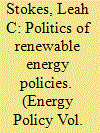| Srl | Item |
| 1 |
ID:
113411


|
|
|
|
|
| Publication |
2012.
|
| Summary/Abstract |
The Japanese electricity sector is facing serious challenges in the aftermath of the Fukushima nuclear disaster. The government has responded to the crisis with a new feed-in-tariff to promote increased utilization of renewable energy, and proposed to reduce the dependence on nuclear power. In this viewpoint, we liken the transition implied by recently updated goals for the diffusion of renewables in Japan to the transition in Germany in the last decade. We argue that some of the lessons learned in Germany might prove valuable for the steps Japan considers taking. In particular, we focus on the new Japanese feed-in tariff for solar photovoltaics. In view of the recent developments in Germany, we emphasize the importance of the scheme's political legitimacy, which needs to be maintained through adequate design of both policy instrument and political process. We conclude with policy implications and a targeted research agenda.
|
|
|
|
|
|
|
|
|
|
|
|
|
|
|
|
| 2 |
ID:
121304


|
|
|
|
|
| Publication |
2013.
|
| Summary/Abstract |
Designing and implementing a renewable energy policy involves political decisions and actors. Yet most research on renewable energy policies comparatively evaluates instruments from an economic or technical perspective. This paper presents a case study of Ontario's feed-in tariff policies between 1997 and 2012 to analyze how the political process affects renewable energy policy design and implementation. Ontario's policy, although initially successful, has met with increasing resistance over time. The case reveals key political tensions that arise during implementation. First, high-level support for a policy does not necessarily translate into widespread public support, particularly for local deployment. Second, the government often struggles under asymmetric information during price setting, which may weaken the policy's legitimacy with the public due to higher costs. Third, there is an unacknowledged tension that governments must navigate between policy stability, to spur investment, and adaptive policymaking, to improve policy design. Fourth, when multiple jurisdictions pursue the same policies simultaneously, international political conflict over jobs and innovation may occur. These implementation tensions result from political choices during policy design and present underappreciated challenges to transforming the electricity system. Governments need to critically recognize the political dimension of renewable energy policies to secure sustained political support.
|
|
|
|
|
|
|
|
|
|
|
|
|
|
|
|